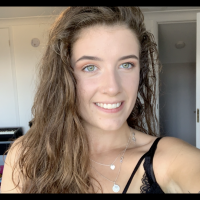View this post on Instagram
From around the age of seven, I can remember a growing uneasy feeling in my chest and stomach.
Kind of like butterflies but imagine those butterflies are stinging you and sending electricity into your body at full strength. Not only did those sensations distress me but also the accompanying visuals I would see in my mind of my worst fears playing over and over and over again.
When I was that age, I did not have the awareness that mental health disorders existed so in my mind I was obviously seriously ill to be worrying about everything, all of the time. I would interrogate my parents about where we were going in great depth, asking the same questions over and over again trying to prevent anything bad or unexpected occurring.
I always had an awful fear of needles growing up. I would repeatedly ask whether a vaccination would hurt; I would lay in bed trying to figure out a way of escaping from the doctor’s office, and avoiding the anxiety of a needle in my arm. I once even drew a picture for my dentist believing it would somehow make him be nicer to me when giving me a filling. I can also remember another time thinking I had lung cancer because I was breathing weirdly and had chest pains, symptoms I later found out to be common with anxiety disorders.
As I grew up, so did my anxiety. I would worry about getting caught in a terrorist attack, being in a car accident, getting murdered, kidnapped, or just chronically worry about my health, such as having appendicitis or cancer. I can remember being so upset and unsettled by the emotions, thoughts, and sensations that would flood my body on a daily basis that I would sit and go over and over them in my head trying to find a solution. Being the scared child I was, I decided to keep it to myself in case telling my parents would cause them to take me to the hospital (another anxiety-inducing environment for me), which meant it took a while for it to become clear just how much I was struggling.
Fast forward 14 years, I am now 21 years old and have been diagnosed with Obsessive Compulsive Disorder, which has explained many aspects of my childhood. Most people have the preconception that OCD is linked solely to hand-washing, contamination, light switch flicking, and liking things to be in order, which is extremely inaccurate and contributes to the lack of awareness about the condition.
I can tell you firsthand that it is like having an insidious monster living within your mind attacking anything you value. I value honesty, being a “good” person, my relationship, my family my health, and many other things, which the OCD monster likes to pick apart and turn into a living hell.
Everybody experiences OCD differently, which means there is no clear-cut explanation or definition that will include each individual experience. However, there is one aspect that is common in everybody’s experiences: the inability to cope with uncertainty. To many people, the saying “trust your gut” is a positive advice-like phrase that invokes trusting your feelings and intuition, but what about if you don’t know because you doubt everything? Many people accept that uncertainty is part of the human experience, but when you speak to someone suffering from OCD, you will quickly realise that uncertainty and needing to know for sure are regular battles faced in their lives.
It is so easy for those living their lives without the disorder to imagine what it must feel like, but the truth is, unless you suffer from it, you will never imagine how torturous it can be. It is far from just liking things “neat” or “colour coded”—that is only one way it can manifest. More debilitating, still, is near-constant reassurance-seeking, checking until it feels “right,” mentally reviewing scenarios, counting, analysing every thought, every feeling.
Additionally, those who suffer from OCD are often extremely morally responsible and perfectionists by nature making it feel like a constant fight with your own mind.
I would like to say that without the help of ERP (Exposure and Response Prevention therapy) and mindfulness, I would not feel there was any hope for a mind that never stops.
I am slowly seeing that no diagnosis needs to define anyone, or should for that matter.
~


 Share on bsky
Share on bsky




Read 2 comments and reply